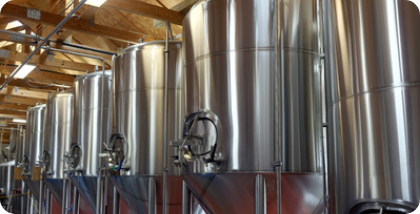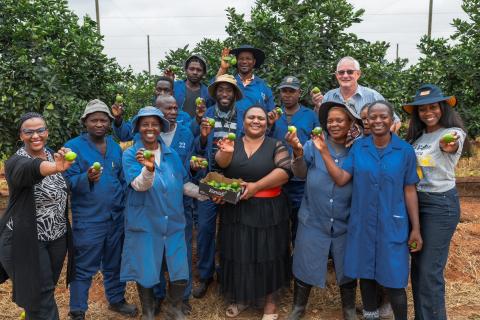
Johannesburg. 23 June 2015. The South African Breweries (SAB) has launched a sustainable agriculture programme in the North West province city of Taung, assisting emerging barley farmers to run sustainable and economically viable entities. At least 102 emerging farmers, over a total of 1, 115 hectares of irrigated land, will participate in the Better Barley Better Beer programme which, in partnership with the World Wildlife Fund for Nature of South Africa (WWF-SA), encourages and supports sustainable farming practices amongst South African barley farmers. Taung farmers provide SAB with around 7% of the total irrigated barley crop produced.
In addition, they provide SAB with 10 000 tons of maize or 6% of the company’s maize requirement SAB has had a close working relationship with Taung farmers since the establishment of the Taung Barley Farmers programme in 1994. The programme is aimed at encouraging local barley production, creating a broad based supply chain for SAB and a sustainable source of income for smallholder farmers. The initiative has grown to support more than 102 smallholding barley farmers.
The Better Barley Better Beer programme is an extension of this relationship and forms part of SAB’s broader Sustainable Development framework, Prosper, which has sustainable agriculture, support of emerging, small business and reducing water use and carbon emissions as some of its key target areas. Prosper is SAB’s targeted approach towards building strong South African communities. It highlights tangible targets to be achieved by the company over the next five years in the areas of responsible alcohol consumption, water security, reducing waste and carbon emissions, supporting small enterprises, including emerging farmers and the support of responsible and sustainable land use for brewing crops.
“Supporting the growth of emerging, small scale producers and their migration into the mainstream agricultural sector is a critical area of focus for SAB. We are developing and supporting a sustainable, reliable and commercially competitive local agricultural footprint able to provide SAB with its total raw material requirement. This will help to create jobs, strengthen the local economy and build SAB’s supply chain, ” says Thinus van Schoor, General Manager SAB Maltings and Hop Farms.
The broad focus of the Better Barley Better Beer programme is on water reduction, improved carbon footprints, soil health, clearing of alien vegetation, and the protection and restoration of critical ecosystems. Better Barley Better Beer Guidelines for Taung farmers take into consideration the specific needs of the small scale farmer, including their smaller production units and reduced disposable income available for additional sustainability related capital investments and infrastructure maintenance.
The Better Barley Better Beer initiative was introduced by SAB to create a user-friendly guide for farmers who supply SAB with barley, on how to improve the economic value of their farms, protect the environment and ensure sustainable socio-economic conditions. The guidelines are created around 3 pillars of sustainable development, which include the Economic, Social and Environmental Principles. The Economic pillar deals with improved management of the farm, the Social pillar focuses on labour relations between farm owners and employees, as well as issues of health and safety, and the final pillar, Environment, guides farmers on how to look after soil, crops and the correct use of water.
Checklists under each of the pillars provide farmers with clear performance indicators as a means of outlining where corrective measures need to be implemented. The Economic Principle is focused on maintaining and enhancing economically viable farm production.
The farmer must be aware of all of the resources and conditions that exist on and around the farm, including soil, water and climate change, and use these in the best possible manner to ensure a sustainable economic return. Farmers should ensure that resources are protected and not wasted such as in the case of over-irrigation.
The farmer must also manage all parts of the farm and make sure they work together to produce the best possible crop with the least amount of resources. The Social Principle guides farmers on the rights and wellbeing of their employees and the local community, in which they operate, as well as the health and safety of the working environment and the safety of crops. The Environmental Principle guides how farmers conserve natural resources and biodiversity, critical ecosystem services and that ecological systems are maintained and agricultural resources are sustainably used.
This also includes guidance on the correct use of soil, plants, natural vegetation around the farm and the crop itself, and water. Training on how to implement the Better Barley Better Beer Guidelines will be provided to the participating farmers by SAB Agriculturalists over a two-year period.
For further information, contact: Azure Janneker, SAB Media Communications Tel: 011-881-8562 or email: Azure.Janneker@za.sabmiller.com
For the latest SAB news, follow us on:
www.sab.co.za
Twitter: @SABreweries
Facebook: SouthAfricanBreweries
BACKGROUND:
SAB AND SUSTAINABLE DEVELOPMENT: SAB’s Sustainable Development framework, Prosper, is built around five shared imperatives against which the company aims to achieve set targets over the next five years. The imperatives are:
- A Sociable World in which we endeavour to make beer the natural choice for the moderate and responsible drinker through effective communication campaigns; support of responsible retail practices, road safety awareness and enforcement, including drinking and driving; and reduce underage drinking.
- A Resilient World where we will secure shared water resources for our business and local communities. SAB will strengthen its CSI water projects, particularly to contribute towards community water security. We will continue to support and participate in the Strategic Water Partners Network (SWPN), as we believe that it is only through collective action and effective partnerships are we going to secure this critical resource. SAB also aims to reduce its water use to 2.89 per litre of beer by 2020 within our manufacturing process and implement programmes to mitigate shared water risks for our key crops such as hops and barley
- A Clean World in which waste and carbon emissions will be reduced within the business and across the agricultural value chain and distribution network, as well as divert a high proportion of brewery waste from landfill and create new value from waste. We have committed to a 30% total value chain carbon footprint reduction by 2020, while also continuing to reduce the amount of waste that end up in landfills.
- A Thriving World in which we will accelerate growth and social development through our value chains by supporting more than 30 000 small enterprises through our flagship youth entrepreneurship development programme, SAB KickStart, our Customer Business Development Programme (CBD), distribution development programmes like the Owner Driver Scheme and in the agricultural sector through support of emerging famers.
- A Productive World in which we will support responsible, sustainable use of land for brewing crops by creating secure, sustainable supply chains and by helping small-scale farmers increase profitability, production and social development. SAB aims to strengthen the Go Farming initiative, through which we will increase local sourcing of agricultural inputs, particularly from emerging farmers. Together with our partners, we will continue to promote sustainable farming practices through programmes such as Better Barley Better Beer.



